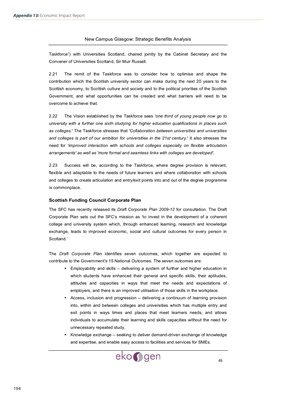
New Campus Glasgow: Strategic Benefits Analysis
46
Taskforce") with Universities Scotland, chaired jointly by the Cabinet Secretary and the
Convener of Universities Scotland, Sir Muir Russell.
2.21 The remit of the Taskforce was to consider how to optimise and shape the
contribution which the Scottish university sector can make during the next 20 years to the
Scottish economy, to Scottish culture and society and to the political priorities of the Scottish
Government, and what opportunities can be created and what barriers will need to be
overcome to achieve that.
2.22 The Vision established by the Taskforce sees 'one third of young people now go to
university with a further one sixth studying for higher education qualifications in places such
as colleges.' The Taskforce stresses that 'Collaboration between universities and universities
and colleges is part of our ambition for universities in the 21st century.' It also stresses the
need for 'improved interaction with schools and colleges especially on flexible articulation
arrangements' as well as 'more formal and seamless links with colleges are developed'.
2.23 Success will be, according to the Taskforce, where degree provision is relevant,
flexible and adaptable to the needs of future learners and where collaboration with schools
and colleges to create articulation and entry/exit points into and out of the degree programme
is commonplace.
Scottish Funding Council Corporate Plan
The SFC has recently released its Draft Corporate Plan 2009-12 for consultation. The Draft
Corporate Plan sets out the SFC's mission as 'to invest in the development of a coherent
college and university system which, through enhanced learning, research and knowledge
exchange, leads to improved economic, social and cultural outcomes for every person in
Scotland.'
The Draft Corporate Plan identifies seven outcomes, which together are expected to
contribute to the Government's 15 National Outcomes. The seven outcomes are:
• Employability and skills - delivering a system of further and higher education in
which students have enhanced their general and specific skills, their aptitudes,
attitudes and capacities in ways that meet the needs and expectations of
employers, and there is an improved utilisation of those skills in the workplace.
• Access, inclusion and progression - delivering a continuum of learning provision
into, within and between colleges and universities which has multiple entry and
exit points in ways times and places that meet learners needs, and allows
individuals to accumulate their learning and skills capacities without the need for
unnecessary repeated study.
• Knowledge exchange - seeking to deliver demand-driven exchange of knowledge
and expertise, and enable easy access to facilities and services for SMEs.
194
Appendix 13: Economic Impact Report